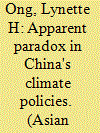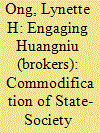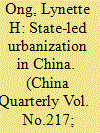| Srl | Item |
| 1 |
ID:
117658


|
|
|
|
|
| Publication |
2012.
|
| Summary/Abstract |
China, the world's largest energy consumer and greenhouse gas emitter, appears to have contradictory climate policies. While aggressively pursuing a renewable energy policy, Beijing is weak on a commitment to emissions reduction. The "paradox" can be reconciled on the basis of China's priority for growth, which is critical in ensuring the Communist Party's grip on power.
|
|
|
|
|
|
|
|
|
|
|
|
|
|
|
|
| 2 |
ID:
163666


|
|
|
|
|
| Summary/Abstract |
A strong authoritarian state such as China has a range of institutions and instruments at its disposal to resolve social conflicts. This study proposes a new mechanism—citizen’s engagement of a profit-seeking broker—that helps to facilitate state-society bargaining, resolve conflicts and thereby absorb social contention. This form of state-society bargaining is conducted via professional brokers whose objective is to make a profit from the transactions. By establishing trust between the officials and citizen, the broker brings the two parties together, enables and facilitates state-society bargaining that would not have taken place otherwise. In so doing, the broker helps to resolve conflicts or protracted stand-offs that might have spilled into street protest. These profit-seekers represent commodification of state-society bargaining by matching demands from discontented citizens with supplies of special favours by state officials. This study contributes to the growing body of conflict resolution and state repression literature in China.
|
|
|
|
|
|
|
|
|
|
|
|
|
|
|
|
| 3 |
ID:
131954


|
|
|
|
|
| Publication |
2014.
|
| Summary/Abstract |
This article examines the rationale behind municipal and local governments' pursuance of urbanization, and the political and socio-economic implications of the policy to move villagers from their farmland into apartment blocks in high-density resettlement areas, or "concentrated villages." It provides evidence of an increasing reliance by municipal and local governments on land revenues and the financing of urban infrastructure by the governments' land-leasing income. Following their relocation to apartment blocks, villagers complain that their incomes fall but their expenditures rise. Moreover, although they cede rights to the use of their farmland to the government, they are not given access to the state-provided social welfare to which urban residents are entitled. The paltry compensation which they receive for their land is insufficient to sustain them. Displaced or landless peasants are emerging as a distinctly disadvantaged societal group, deprived of the long-term security of either farmland or social welfare. The question of whether or not rural land rights should be freely traded is not as crucial to the future livelihoods of landless peasants as allowing them access to the full range of social welfare afforded to urban residents.
|
|
|
|
|
|
|
|
|
|
|
|
|
|
|
|
| 4 |
ID:
161312


|
|
|
|
|
| Summary/Abstract |
Using violence or threat of violence, “thugs-for-hire” (TFH) is a form of privatized coercion that helps states subjugate a recalcitrant population. I lay out three scope conditions under which TFH is the preferred strategy: when state actions are illegal or policies are unpopular; when evasion of state responsibility is highly desirable; and when states are weak in their capacity or are less strong than their societies. Weak states relative to strong ones are more likely to deploy TFH, mostly for the purpose of bolstering their coercive capacity; strong states use TFH for evasion of responsibility. Yet the state-TFH relationship is functional only if the state is able to maintain the upper hand over the violent agents. Focusing on China, a seemingly paradoxical case due to its traditional perception of being a strong state, I examine how local states frequently deploy TFH to evict homeowners, enforce the one-child policy, collect exorbitant exactions, and deal with petitioners and protestors. However, the increasing prevalence of “local mafia states” suggests that some of the thuggish groups have grown to usurp local governments’ autonomy. This points to the cost of relying upon TFH as a repressive strategy.
|
|
|
|
|
|
|
|
|
|
|
|
|
|
|
|